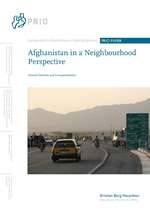For over three decades, Afghanistan has been a battleground in which many of the states of the larger neighbourhood have been involved. The importance of fostering a concerted effort for Afghan peace and stability is increasingly agreed upon. Some analysts emphasize states and their security relationships and see Afghanistan as an ‘insulator’ caught between different regional state systems, each with a strong dynamic of their own. An alternative perspective – which also seems to inform the new US analysis – emphasizes various transnational networks, and sees Afghanistan as the ‘core’ of a larger conflict formation.
This paper takes the former perspective – codified by Barry Buzan and Ole Wæver in the Regional Security Complex approach – as its starting point. It pursues the security dynamics of each of the core regions surrounding Afghanistan (South Asia, the Persian Gulf and South Asia), taking a comparative and historical perspective, with an emphasis on the period since the late 1970s. It concludes that each of Afghanistan’s three surrounding regions is characterized by deep security concerns that have little to do with Afghanistan. These concerns nonetheless inform their engagement in Afghanistan, which comes to reflect conflicts and cleavages specific to the region. One implication is that for Afghanistan, it may be a more promising strategy to seek a unilateral non-offensive or neutral status, rather than security integration with its neighbours. While this would necessitate a forum of Afghanistan’s neighbours in order to foster understanding for the Afghan position, it suggests a dramatic departure from mainstream policy proposals with their emphasis on an integrated regional approach.
This is the first of four PRIO Papers from the project 'Afghanistan in a Neighbourhood Perspective', funded by the Royal Norwegian Ministry of Foreign Affairs. The three following papers will each be focused on one of the three core regions surrounding Afghanistan: South Asia, the Persian Gulf, and Central Asia.








